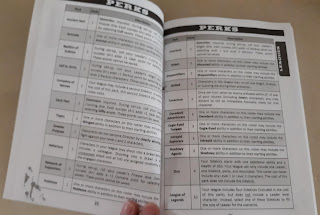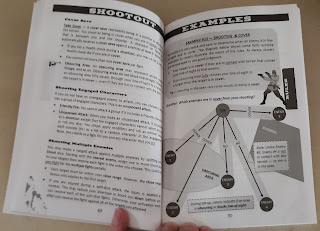While at Adepticon, I was finally able to play a large demo game of Pulp Alley after years of interest. Blown away by how much fun the system was, I went to order a copy and found out that the game designer, David Phipps, had a Kickstarter campaign for version 2. $50 and a few months later, I received my pledge - a PDF of the rulebook, an 8.5"x6" softcover rulebook, a small 6" ruler/rules reminder, two packs of Fortune cards, and a pack of Known Associates cards.
You have to understand that this game is completely self-made by the creator, without any assistance from a larger game company, from (as far as I can tell) his own home. With that in mind, this game is as good (if not better) than many of the games put out by much larger game companies. The rulebook is well bound, in a nice handheld size with a glossy cover. The cards are all good quality, having the thickness of playing cards and a satin/semi-gloss finish. I would recommend putting these in some card protectors to extend their life and keep them looking brand new.
What is "Pulp"? Pulps were cheap, often lurid magazines popular in the early 20th century, usually before the widespread use of television, that entertained the masses with stories of brave explorers, cowboys, fighter pilots, and other heroes. Characters such as Tarzan, The Shadow, and Doc Savage were popular Pulp heroes and served as the template for other heroic characters that would be popularized in film long after the pulps had disappeared - Indiana Jones, The Rocketeer, Jack Burton. Pulp Alley focuses on these types of of heroic adventures however, the system is so open-ended that it could be used for a wide variety of miniature gaming from the Old West, early 20th century wars, and into Science Fiction.
Pulp Alley games are usually two or more players (though solo play is possible) who choose a warband or unit of between 3-6 characters (though larger size units, known as Mobs, are possible) who fight over control of themed objectives known as "Plot Points". Each character has a variety of stats and special abilities. Uniquely, Pulp Alley does not force your miniatures to be WYSIWYG (though it's still encouraged), as each character is defined by their statistics and abilities. Additionally, Pulp Alley uses a multiple dice system (from d6 to d12) to represent various levels of ability, difficulty, and damage with "successes" be consistently measured by rolling 4+ on any one dice.
In keeping with a cinematic feel, each turn, the initiative of play is dictated by "The Director" and this role can (and will!) switch between players every turn. The Director chooses which player may act and the chosen player activates one of their characters. Each activation the character can move and choose one action or attack. Once that character has completed its activation, The Director assigns play to the next player (or the same player), until all characters have activated.
And I hear the complaints now - "so I just have to sit around while other players act?". No, this is where the Fortune deck (and your hand of cards) comes into play. You may play Fortune cards to steal The Director's role, force other characters to activate, force characters to re-roll or re-do an action....if you can think of it, there is very likely a card that allows you to do it. This provides a feeling of suspense and dynamism as inactive players can change the fortunes of the active player and (in a group with more players) often will end up attempting to out-do each other with who can change the game quicker.
Character creation is very straightforward and user-friendly with a long list of special abilities, perks, and backgrounds. Want to have a debonaire secret agent with his secret agent buddies? You can do that. A world-traveling archeologist with a spunky female sidekick and his native guide? You can do that. Nefarious villain from the Far East with mystic henchmen? Lovecraftian cult leader with a gang of flunkies? Disguised aliens bent on world conquest? You can do all of it. Version 2 has also introduced an expanded weapons section, mounts and vehicles, as well as backgrounds and resources to give your warband a unique feel.
All in all, I've really enjoyed this game and have been surprised by just how easy it is to pick up and get hooked by. How this game doesn't have a much larger fan base is a mystery, as it would seem to attract the same crowd that have made other skirmish games like Frostgrave such massive hits. If you can, I would highly suggest picking up a copy and trying out a few games yourself.
Pros:
- Engaging, fast-paced game suitable for nearly any genre
- Well laid out, concise rulebook
- Lots of gameplay examples
- Despite overall book/card size, clear and legible font is easy to read
- Good quality cardstock
- Known associates cards are double-sided (edit!)
- Interior paper of rulebook is somewhat flimsy









2 comments:
Good stuff! We're always glad to see what folks have to say about Pulp Alley. Thanks so much for taking the time to share your thoughts.
Just as a very minor point regarding one of the "cons", please flip your Known Associates cards over and see what's on the back. :)
I hope we get to see more.
HAVE FUN
Dave
Pulp Alley
Oh boy, do I feel dumb.
Post a Comment